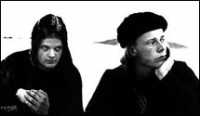The Solefald history dates back to the autumn of 1995 when melodic Black Metal was still a rather new and popular genre. Solefald were founded by Lazare and Cornelius, both with long musical experience from Techno-Thrash bands. Solefald's "Jernlov" demo tape came into being in this mythological environment. With their twisted view on Black Metal, Solefald stood out from their Norwegian contemporaries. A two-album deal with the Milanese label Avantgarde Music was soon inked. Solefald's unconventional debut album, "The Linear Scaffold", was released in July 1997, and magazines such as Ablaze, Terrorizer and Scream offered excellent reviews. Enjoyed in the less conservative parts of the underground, the album managed to provoke people with its innovative expression, to the extent that the band actually received a death-threat. "The Linear Scaffold" can be broadly defined as a Black Metal album with radical lyrics. This may seem contradictory to the BM purist, but Solefald have been a difficult and apparently contradictory project all the way. This was one of the reasons why the band initially labelled their music "Red Music with Black Edges", radicalising their expression without betraying its Black Metal foundations. From the beginning of Solefald, Lazare and Cornelius felt a hollowing in the BM scene, a hole lying wide open between the early, grim Burzum, the symphonic Emperor and Cradle of Filth in their "Principle of Evil Made Flesh" days. These bands were among Solefald's primary musical references, but none of them possessed the musically and lyrically radical attitudes Solefald sought after.
Cornelius, for his part, knew this radicality from bands such as Warrior Soul on one hand and Fear Factory on the other. Solefald have never felt at home in a universe of psalms and tortured women, dungeons and dragons, upside-down crosses and swastikas. "The Linear Scaffold" drew on the pictoral art of Odd Nerdrum, the poetry of Lord Byron, the music of Beethoven, Norwegian pantheism and existensialist philosophy. The album's feeble echoes of Deep Purple and Sex Pistols (organ arrangements and downstroke riffs) could be comprehended by the sensitive ear. Solefald entered Sunlight Studios in the late autumn of 1998 to record their second album.
"Neonism" arose during four hard weeks, including problems with a mixing desk that literally started burning during the recording. The album was released later that fall, sending shock waves into the underground with its bitingly satirical approach to popular culture in general and the Black Metal genre specifically. Solefald, choosing to call their music "Radical Designer Rock'n'Roll", provoked a lot of people, but pleased even more, and again the band harvested excellent reviews. "Neonism" surprised listeners and critics by diverging so strongly from "The Linear Scaffold". The album tried to fuse elements of Punk, Trip Hop, Drum'n'Bass, Reggae, Oriental Music and Progressive Rock with technical Black Metal. It now seems that "Neonism" may have been perceived as too experimental and too unconventional by many listeners, insofar that the album made no compromise whatsoever. "Neonism" was a musical experiment, orchestrated by a band wanting to take off their Black Metal blindfolds for a while. "Neonism" completed the deal with Avantgarde Music, and Solefald felt it was time to move on. Along came Century Media, and Solefald's third effort, "Pills Against the Ageless Ills". Recorded in the H-10 studio in Oslo, this concept album is yet another step on Solefald's weird and wonderful path. "Pills Against the Ageless Ills" could be defined as a synthesis of the two first Solefald albums. Gone are the electronic beats, the overtly Rap-inspired vocals and the eclectic attitude that distinguished "Neonism" from most of 1999's Black Metal releases. "Pills" is harder, faster and more straightforward than its predecessors. For once, one could simply call it Heavy Metal without being unjust to the music. The new Solefald opus presents a more powerful guitar sound. The punchy downstroke riffs show their debt to traditional Heavy Metal (for example the "Hierarch" song). The organ complements the guitars all the way, adding a progressive dimension to the music. A new soreness characterises Lazare's vocals, more direct this time. Cornelius' spoken vocals have clearly been infested by his guest appearance on the Monumentum song "Black and Violet" (a Death SS cover, recorded in July 1999). His mourning voice displays a state of spiritual anguish, seeking relief and release. Release is found in the furious Black Metal passages still present in Solefald's music.
